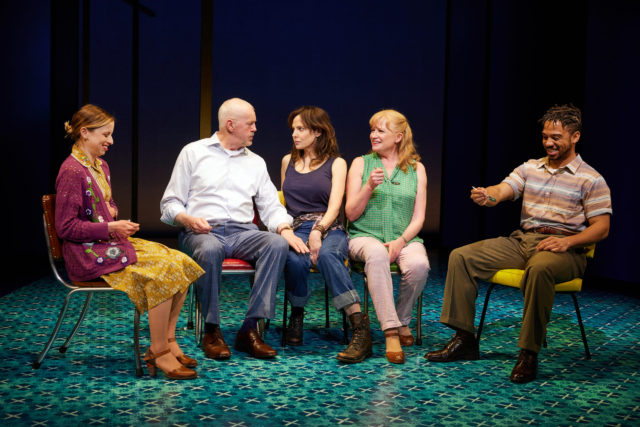
David Morse, Mary-Louise Parker, and Johanna Day (center three) reprise their roles in Broadway debut of How I Learned to Drive (photo © Jeremy Daniel 2022)
HOW I LEARNED TO DRIVE
Samuel J. Friedman Theatre
261 West Forty-Seventh St. between Broadway & Eighth Ave.
Tuesday – Sunday through June 12, $79-$299
www.manhattantheatreclub.com
“I’m just a very ordinary man,” Peck says in Paula Vogel’s How I Learned to Drive, making its stunning Broadway debut at MTC’s Samuel J. Friedman Theatre through June 12.
“I’ll bet your mother loves you, Uncle Peck,” his teenage niece, Li’l Bit, replies.
The beauty of Vogel’s Pulitzer-winning drama is in its simplicity, the very ordinariness of a complex story about child sexual abuse and its lasting effects on the survivor.
In 1997, forty-three-year-old David Morse and thirty-two-year-old Mary-Louise Parker starred in How I Learned to Drive, he as Peck, she as Li’l Bit, both named after their genitalia. The play primarily takes place in backward chronology from 1969, when he is fifty-two and she is seventeen, except for two key detours to 1970 and 1979. Twenty-five years later, the actors have returned to the parts they originated, joined by the same director, Mark Brokaw, and Johanna Day, who, as Female Greek Chorus, also portrays Li’l Bit’s mother; joining the cast is Alyssa May Gold as Teenage Greek Chorus and Li’l Bit’s grandmother, and Chris Myers as Male Greek Chorus and Li’l Bit’s grandfather, among other characters.
Having Morse and Parker reprise their roles is a stroke of genius; over the last quarter century, their stature as consummate actors has grown, so we are immersed in their characters immediately. Parker, in particular, is a wonder, embodying the teenage Li’l Bit with small gestures and movements that make us forget that she is some forty years older. But the casting also reminds us that in the last twenty-five years, child abuse and pedophilia is still one of society’s most shameful ills, brought to light again in the #MeToo era.
When Peck tells Li’l Bit, “I have loved you every day since the day you were born,” the audience lets out an audible gasp.

Li’l Bit (Mary-Louise Parker) gets life lessons from Female Greek Chorus (Johanna Day) and Teenage Greek Chorus (Alyssa May Gold) (photo © Jeremy Daniel 2022)
Inspired by Nabokov’s Lolita as well as the sexual abuse that she herself suffered, Vogel uses driving lessons as a metaphor for Peck’s grooming of Li’l Bit as his potential victim. The Greek Chorus announces shifts in scenes with such phrases as “Safety First — You and Driver Education,” “Idling in the Neutral Gear,” “You and the Reverse Gear,” and “Implied Consent,” along with subtle changes in lighting by Mark McCullough and sound and original music by David Van Tieghem.
Rachel Hauck’s streamlined set features constantly changing furniture — chairs, tables, a bed — with the only constant a tall wooden post that evokes telephone poles along the road as well as a cross. Dede Ayite’s costumes are straightforward dress; the characters can be anyone, at any recent time.
Li’l Bit’s dilemma is exacerbated when she begins growing breasts, larger than her classmates’. She is teased and made fun of not only by the boys and girls in school but by her own family, who sexualize her with dangerous lessons. “I told you what my mother told me! A girl with her skirt up can outrun a man with his pants down!,” her grandmother says. Her grandfather warns, “If Li’l Bit gets any bigger, we’re gonna have ta buy her a wheelbarrow to carry in front of her.” Her mother teaches her, “Never mix your drinks. Stay with one all night long, like the man you came with . . . damn the torpedoes, full speed ahead!”
Li’l Bit knows from the very start that what Uncle Peck is doing is wrong, but he is so calmly persuasive that she keeps sticking around him. In a key scene, she watches as Peck teaches her cousin Bobby how to fish, essentially a primer for how a man can lure a woman into something she doesn’t want to do. “We’re going to aim for some pompano today — and I have to tell you, they’re a very shy, mercurial fish. Takes patience, and psychology. You have to believe it doesn’t matter if you catch one or not,” he says.
In a car, Uncle Peck tells Li’l Bit, “Put your hands on the wheel. I never want to see you driving with one hand. Always two hands.” After hesitating, she replies, “If I put my hands on the wheel — how do I defend myself?”

Uncle Peck (David Morse) grooms Li’l Bit (Mary-Louise Parker) in powerful revival of Paula Vogel’s Pulitzer winner (photo © Jeremy Daniel 2022)
Peck is a knowledgeable fisherman, understanding just how to approach his prey. Tony nominee Morse (The Iceman Cometh, The Unavoidable Disappearance of Tom Durnin) is so successful in the role that, at the talkback that followed the matinee I saw, several women embarrassingly admitted that they were taken in by his character, that they had trouble seeing him as a predator but instead thought he was just a nice guy. That’s precisely what sexual abusers do, fool the observers, and Morse nails it. We want to like him, want him to be our cool uncle too, until we don’t.
Tony winner Parker (The Sound Inside, Proof) is astonishing as Li’l Bit; her timeless, youthful qualities once again shine as she ages seventeen years in the play. Our hearts ache for Li’l Bit as her uncle’s pursuit of her intensifies, but Parker, as ravishingly beautiful as ever, uses her age and experience to give the teenage girl added depth; the audience can’t help but feel her every emotion and search their own lives to examine mistakes they might have made or situations in which they looked the other way. It’s one of the best performances of an adult as a child you’re ever likely to see.
Day (Sweat, The Nap) is excellent as always as the enabler in all of us, while Gold (Taking Woodstock, Our Dear Dead Drug Lord) is a marvel in multiple roles, including a powerful surprise at the end.
Vogel (Indecent, The Baltimore Waltz) and Brokaw (Heisenberg, The Lyons) have done a superb job reimagining this hard-hitting yet delicate, crucial work for these times, a play that in itself is a primer for how to recognize sexual abuse and, hopefully, be able to reach for the brakes. As Li’l Bit warns us, “Sometimes to tell a secret, you first have to teach a lesson.”